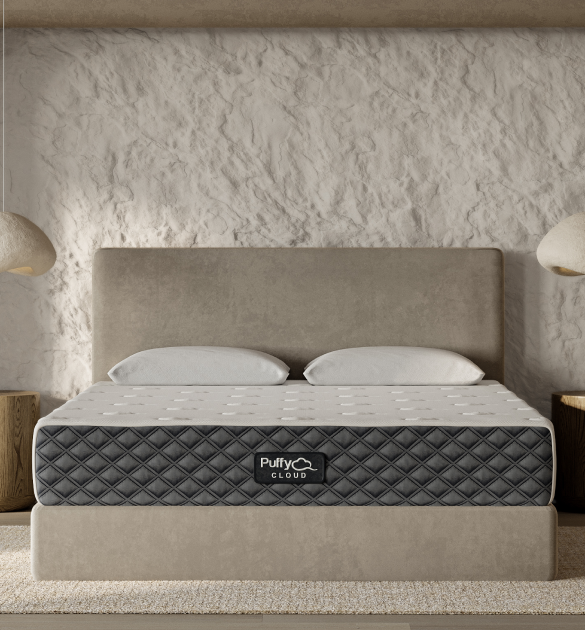The foundation you choose for your mattress is as crucial as the mattress itself. Understanding what goes under your mattress is key to ensuring comfort, support, and durability of your sleep setup.
This article delves into various options for what to place under different types of mattresses, including traditional beds, platform beds, RVs, and air mattresses.
What Goes Under the Mattress
Box Springs: A Traditional Choice
- Ideal for Innerspring Mattresses: Box springs provide a supportive and shock-absorbing layer, extending the life of innerspring mattresses.
- Construction: Typically consisting of a wooden frame, metal coils, and a fabric covering, they add height and support.
- Less Compatible with Foam Mattresses: Due to their flexible nature, box springs are not recommended for foam mattresses, which require a more stable base.
Slatted Foundations: Modern and Supportive
- Versatility: Slatted foundations are compatible with a wide range of mattresses, including foam, latex, and hybrid models.
- Airflow Benefits: The gaps between slats allow for air circulation, aiding in temperature regulation and mattress breathability.
- Slats Spacing: It’s crucial to ensure the slats are appropriately spaced (not more than 3 inches apart) to provide adequate support and prevent sagging.
Platform Beds: Sleek and Convenient
- Integrated Support: Platform beds include a built-in foundation, either with a solid surface or slats, suitable for most mattress types.
- No Need for Box Springs: They eliminate the need for a separate box spring, offering a modern, streamlined look.
- Variety of Styles: Available in various designs, platform beds can complement any bedroom décor while providing necessary mattress support.
Puffy mattresses, designed to provide exceptional comfort, work well with various types of foundations, ensuring versatile setup options.
What Do You Put Under a Mattress for Support
When it comes to enhancing the comfort and lifespan of your mattress, selecting the right support is crucial. Here are the best options to consider:
Box Springs: The Classic Support System
- Structure: Box springs consist of a wooden frame with metal coils and a fabric cover.
- Best Use: They are traditionally paired with innerspring mattresses to provide a sturdy, shock-absorbing base.
- Consideration: For foam or latex mattresses, a box spring may not offer the solid support needed, potentially leading to faster wear of the mattress.
Solid Platforms: Uniform Support
- Design: Solid platforms offer a flat, uniform surface, making them ideal for foam and latex mattresses.
- Advantages: They provide even support across the mattress, preventing sagging and enhancing mattress durability.
Bunkie Boards: A Minimalist Approach
- Functionality: Bunkie boards are flat, thin boards placed under the mattress, suitable for foam mattresses used on slatted beds or older box springs.
- Benefit: They offer a stable surface without significantly altering the bed’s height.
Adjustable Bases: Customizable Comfort
- Flexibility: Adjustable bases allow you to change the bed’s contour to suit various sleeping positions and comfort preferences.
- Health Benefits: They can offer relief for certain medical conditions, such as acid reflux or back pain, by allowing the sleeper to adjust their sleeping position.
Plywood: A Quick Fix
- Temporary Solution: In some cases, a piece of plywood can be used as a temporary measure to provide a flat, firm surface, especially for foam mattresses on slatted frames.
- Note: Plywood should be used cautiously as it can restrict airflow to the mattress.
Are Box Springs Necessary Under a Mattress?
- Traditional Use: Box springs were once a necessity for innerspring mattresses to provide support and height.
- Modern Alternatives: Many modern mattresses, including foam and hybrid types, do not require box springs. A solid or slatted foundation often suffices.
Interested in how Puffy stacks up against other brands? Check out our mattress comparisons: Puffy vs Purple, Puffy vs Nectar, Puffy vs Casper, Puffy vs Leesa, Puffy vs Saatva, Puffy vs DreamCloud, and Puffy vs Tuft and Needle.
Why Do You Need a Box Spring Under Your Mattress?
- Support and Height: Box springs elevate the mattress, making it easier to get in and out of bed, and provide a uniform support system.
- Shock Absorption: They absorb impact, reducing wear and tear on the mattress.
What to Put Under Mattress on Platform Bed
- Nothing Extra Needed: Platform beds come with a built-in foundation, usually slats or a solid base, eliminating the need for a box spring.
- Mattress Protector: Consider a breathable mattress protector to enhance mattress longevity.
Check out Puffy mattress reviews from real customers and see how we compare with other brands.
What to Put Under RV Mattress
- Ventilated Platform: Due to limited airflow in RVs, a ventilated platform can prevent moisture buildup.
- Bunkie Board or Plywood: These provide a flat, stable surface, especially important in a moving vehicle.
What to Put Under an Air Mattress
- Protective Layering: Use a rug, foam pad, or tarp under the air mattress to protect it from punctures and insulate against cold ground.
- Elevated Frames: Some prefer to place air mattresses on frames for added height and support.
For an RV setup, using a Puffy Cloud Mattress can provide the needed comfort and is adaptable to various supportive bases.
Conclusion
Choosing the right base for your mattress is crucial for maximizing its benefits and lifespan. Whether you opt for a traditional box spring, a slatted foundation, or a specialized base for an RV or air mattress, the key is to ensure that your mattress receives proper support and ventilation.
Use our store locator to find the closest furniture or mattress store near you and feel the cloudlike comfort of our Puffy Mattress in person.
Understanding these options allows you to make an informed decision for your specific sleeping needs and preferences.

- 6 layers of award-winning luxury.
- Medium-firm feel.
- Responsive memory foam.
- 101-night sleep trial.












